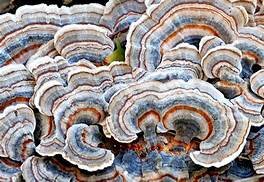You may find yourself adding mushrooms to stir-fry, topping a bowl, an accompaniment to tacos, creating a sauce, or even drinking mushroom coffee. Yes, it exists. Need more? There is protein powder derived from fermented shiitake mushrooms.
Mushrooms have been used in the health arena for treating both simple and complex diseases, ranging from skin ailments to AIDS to cancer. Mushroom polysaccharides, particularly beta-glucans, are known for their immunomodulating and antitumor properties.
Why are these beta-glucans of significance? Our immune system. Beta-glucan receptors can be found on macrophages, neutrophils, natural killer cells and T & B lymphocytes. Additionally, beta-glucans support blood glucose levels and have anti-inflammatory, antibiotic, antiviral, and cholesterol-lowering effects.
Beyond beta-glucans, mushrooms are also good sources of protein, fiber, selenium, choline, B vitamins, vitamin C, vitamin D (if grown in sunlight), and the amino acid ergothioneine. Ergothioneine acts as an antioxidant and, unlike most antioxidants, is able to access the mitochondria.
Therapeutic Effects of Mushrooms
Even white button mushrooms have shown therapeutic value in reducing aromatase activity. What is the significance? Aromatase is an enzyme that converts androgens, androstenedione and testosterone, to estrogen, estrone and estradiol, respectively. Hence, medications that function as aromatase inhibitors are frequently utilized for postmenopausal women with estrogen receptor positive breast cancer and even occasionally for men who are troubled with excess estrogen.
Synergy at its best...Even though shiitake, oyster, maitake and king oyster mushrooms have higher amounts of ergothioneine than white button, cremini and portabello mushrooms, the researchers found that people who incorporated any variety of mushrooms into their daily diets had a lower risk of cancer, particularly breast cancer. According to the findings, individuals who ate 18 grams of mushrooms, about 1/8 to 1/4 cup, daily had a 45% lower risk of cancer compared to those who did not eat mushrooms.
Mushroom Supplements
Research began in the late 60's examining the anti-tumor benefits of the hot water extracts from various types of mushrooms. A hot-water extraction process is required to pull the polysaccharides out of the cell walls. Mushroom nutraceuticals are marketed in the form of powders, capsules or tablets - made of dried fruiting bodies, extracts of mycelium with substrate, biomass or liquid fermentation extracts. Mushroom extracts made from fruiting bodies are generally considered to be of higher quality. Avoid mushroom supplements that are mycelium grain-based (i.e., myceliated brown rice).
Mushrooms are a foundational component in regards to cancer care. What are the effects mushrooms have on cancer, according to research:
Antineoplastic properties
Regulation of tumor genes
Decrease in tumor angiogenesis
Increase in malignant-cell phagocytosis
Chemo-sensitizing effects
Protection against chemo-induced bone marrow suppression
What mushroom types should we possibly consider? There are many, but let's highlight some of the heavy hitters.
Chaga (Inonotus obliquus)
Like most mushrooms, chaga functions as an antioxidant providing immune-boosting effects. One unique quality of chaga is its benefits for skin health. Additionally, chaga has been shown to aid in digestive function.
Cordyceps Sinensis
Cordyceps is a promising anti-inflammatory that also affects immune-cell function and helps increase T-helper cells. It's great for energy and managing stress. And, cordyceps has also been shown to be helpful for asthma, chronic kidney disease, diabetes, liver health, and cardiovascular improvements. In a randomized controlled trial, those taking 1 gm daily cordyceps had a 10% decrease in total cholesterol, a 20% decrease in triglycerides, and 76% of subjects increased their HDL levels by 10%.
Lion's Mane (Hericium Erinaceus)
If you need a mushroom for cognitive support, lion's mane is the one. Consuming 750mg daily of lion's mane significantly increased cognitive function scores. Need more? Lion's mane also has multiple other protective properties: anti-cancer, immunomodulating, neuro-regenerative, cardio-hepato-nephro protective, antibiotic, and more.
Maitake (Grifola frondosa)
While all of the mushrooms offer immune benefits, maitake mushrooms are the epitome of immune health. They also have numerous other medical uses, including HIV/AIDS, chronic fatigue syndrome, hepatitis, hay fever, diabetes, hypertension, hyperlipidemia, weight management, polycystic ovary syndrome (PCOS), cancer, and chemotherapy support.
Reishi (Ganoderma lucidum)
Reishi mushrooms are well known for their anti-cancer benefits and immunomodulating properties. With its antioxidant effects, reishi is excellent for the liver and also been shown to be helpful with allergies, cardiovascular health, and blood sugar management.
Shiitake mushrooms (Lentinula edodes)
Research indicates that shiitake mushrooms play a role in lipid and glucose metabolism, regulating blood pressure, possess antioxidant activity, and are responsible for healthy cellular functioning. In addition to the immune-enhancing properties, this 4-week randomized controlled human trial also reported a significant reduction in the inflammatory biomarker, c-reactive protein (CRP). Furthermore, shiitake mushrooms appear to also exert beneficial actions on the gastrointestinal microbiome and gut-brain axis.
Trametes (Coriolus) Versicolor - Turkey Tail
Turkeytail may be the best known mushroom for its cancer benefits. It's been used in treatment and recovery of a variety of types of cancers, including esophageal, lung, stomach, colon and breast cancer. This antioxidant-rich mushroom has also been shown to support healthy immune function, pulmonary health, and also functions as a prebiotic to help maintain intestinal health.
Summary
Eat mushrooms liberally. But do not eat wild mushrooms that have been foraged unless you are absolutely certain what kind they are. Poisonous mushrooms—some resemble edible ones—can cause serious illness, organ damage, even death.
If using mushrooms in a supplemental form, opt for quality - prepared from hot water extracts. Mushroom compounds may have blood thinning properties, so be cautious with medications used for this purpose. Discontinue mushroom supplements one week prior to surgery and it's advisable to hold mushroom supplements for three days following chemotherapy treatments.
Many mushroom types have been shown to have immunomodulating properties as well as inhibiting growth of cancer cells. These mushrooms are commonly used in Asia as an adjunctive cancer treatment and have shown benefits against breast, ovarian, gastric, esophageal, colorectal, and lung cancers.

